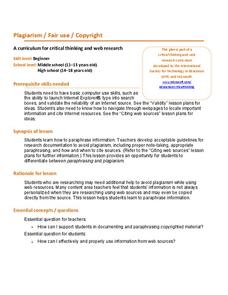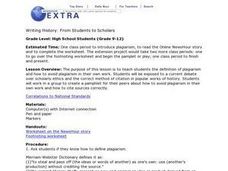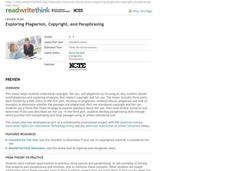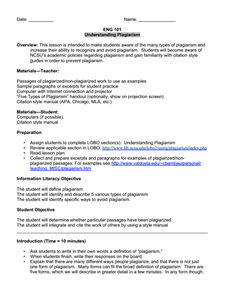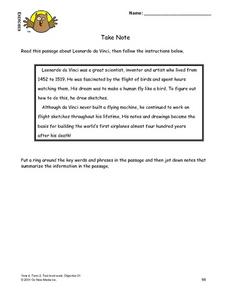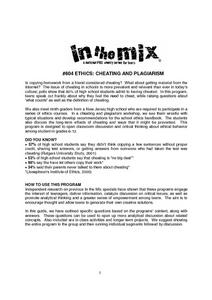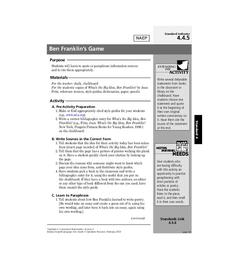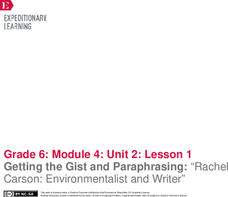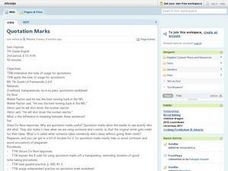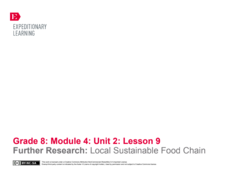K20 LEARN
No Imitations, Please! Avoiding Plagiarism
With all the stuff available online, good essays are just a click away. But talk about tracking! Writers beware! New tech can now identify plagiarism, and the consequences of presenting someone else's work as your own are severe. Here's...
Curated OER
Plagiarism: Avoiding Accidental Internet Plagiarism
Demonstrate how to cite information from Internet sources without plagiarizing. If your class is working on an Internet research paper, and you have observed learners cutting and pasting directly from the Internet, the activities and...
Curated OER
Plagiarism
Don't get caught plagiarizing! Before starting your research unit, use this lesson to help your young writers identify plagiarism. The truth is, many kids don't even realize when they're doing it! They practice citing sources when...
Curated OER
Plagiarism Workshop
What do George Harrison, Vanilla Ice, and Steven Ambrose all have in common? The Warner Brothers’ films Batman Forever and The Devil’s Advocate? All are guilty of plagiarism. And if you are considering a research project and want to...
Microsoft
Plagiarism Fair Use Copyright
Nothing makes junior high and high school teachers more frustrated than plagiarism. Instruct young writers about copyright laws and the correct ways to paragraph information without copying the exact words. A set of secondary-level...
Curated OER
Plagiarism in the Real World
How would you feel if someone plagiarized your work? After class members turn in an assigned newspaper article, you rewrite the piece using elements of their writing. Then you claim you will be selling the story and that you will profit...
Curated OER
Writing History: From Students to Scholars
An Online NewsHour article about scholarly ethics launches this study of plagiarism. Since historians are supposed to bring original ideas and perspectives to their publications, they must give credit to the ideas of others. After a...
ReadWriteThink
Exploring Plagiarism, Copyright, and Paraphrasing
Plagiarism, copyright, and fair use are the focus of a three-part instructional activity designed to inform scholars of how to properly cite others' work. First, pupils use a KWL chart to begin thinking and discussing plagiarism. They...
Curated OER
Please No Posers
How do you reference information correctly? Avoid plagiarism by accurately summarizing a New York Times article with your middle or high schoolers. Young researchers then insert properly attributed quotations and paraphrases into their...
Curated OER
The Original's Sins
Are history textbooks plagiarized? The New York Times article, “Schoolbooks Are Given F’s in Originality,” looks at this question and forms the basis for a lesson on textbooks and plagiarism. The very detailed plan includes resource...
Curated OER
Give Credit Where Credit is Due
Middle schoolers explain what plagiarism is, why it is a problem, and how to avoid it. They articulate why it is unacceptable in a research document, and they show how to avoid it by using proper citation tools. They demonstrate correct...
Southern Nevada Regional Professional Development Program
Focus: Writing a Brief Research Paper
If you are planning on working on a research paper in your class, take a look at this resource first. Starting off with information about plagiarism, the series of activities briefly described here should give your pupils a general idea...
North Carolina State University
Understanding Plagiarism
Introduce budding scholars to the many types of academic plagiarism. Potential plagiarizers develop a definition of the infringement and determine how it has been committed. The instructor provides the writing examples and resources....
Curated OER
Take Note!
Pupils take notes on information they find on the Internet or from other sources. They determine how to avoid plagiarism when gathering information needed. They discuss basic issues and consequences relating to responsible use of...
EngageNY
Research: Paraphrasing Relevant Information
Readers take a look at the source Ethical Style: How Is My T-Shirt Made? and discuss how to say the information in the article without plagiarism. Learners make note of and underline sentences that may present a problem in paraphrasing....
Curated OER
Ethics: Cheating and Plagiarism
Students examine the reasons why students cheat and plagiarize material. They discuss what could have been done to avoid cheating and copying material. They answer questions to end the lesson.
EngageNY
Grade 9 ELA Module 3, Unit 3, Lesson 3
Plagiarism is the theft of intellectual property. To avoid this crime, class members learn how to create a works cited page and how to craft in-text citations. After examining a high-performance model paragraph and an example of a works...
Curated OER
A Time Period in American History
Researchers combine music, narration, photos, and text to form a presentation for their classmates about a time period in American History. Proper research and documentation techniques are emphasized. The lesson plan, created by Apple...
Curated OER
Ben Franklin's Game
A reading of What's The Big Idea, Ben Franklin? provides an opportunity for class members to practice paraphrasing, quoting, and citing sources. An exercise on how to avoid plagiarizing is also included.
EngageNY
Getting the Gist and Paraphrasing: “Rachel Carson: Environmentalist and Writer”
Don't copy me. Scholars prepare to dig in with an introduction to their research folder and a discussion about plagiarism. They then review the meanings of harmful and beneficial and how the words apply to the use of DDT. They finish the...
Curated OER
Language Arts: Quotation Marks Practice
After reviewing the eight rules for using quotation marks, class members complete worksheets as independent practice and review how these punctuation marks change the meaning of a sentence. Additional worksheets are provided for homework.
EngageNY
Further Research: Local Sustainable Food Chain
Researchers review how to create citations, find reliable sources, and paraphrase. Next, using guided task cards and their researcher's notebooks, they investigate the question they developed in instructional activity eight about the...
EngageNY
Deepening Your Research
Give credit where credit is deserved. Scholars discuss what makes a credible source as they take a look at "An Apparel Factory Defies Sweatshop Label, but Can It Thrive?" Learners read the article to look for answers to the research...
Curated OER
Paraphrasing-Timbuktu in Your Own Words
How do you paraphrase information? Part of plagiarizing is taking information word for word and using it in your writing. Teach your writers how to paragraphs correctly to avoid this! They watch a QuickTime video on Timbuktu and...






